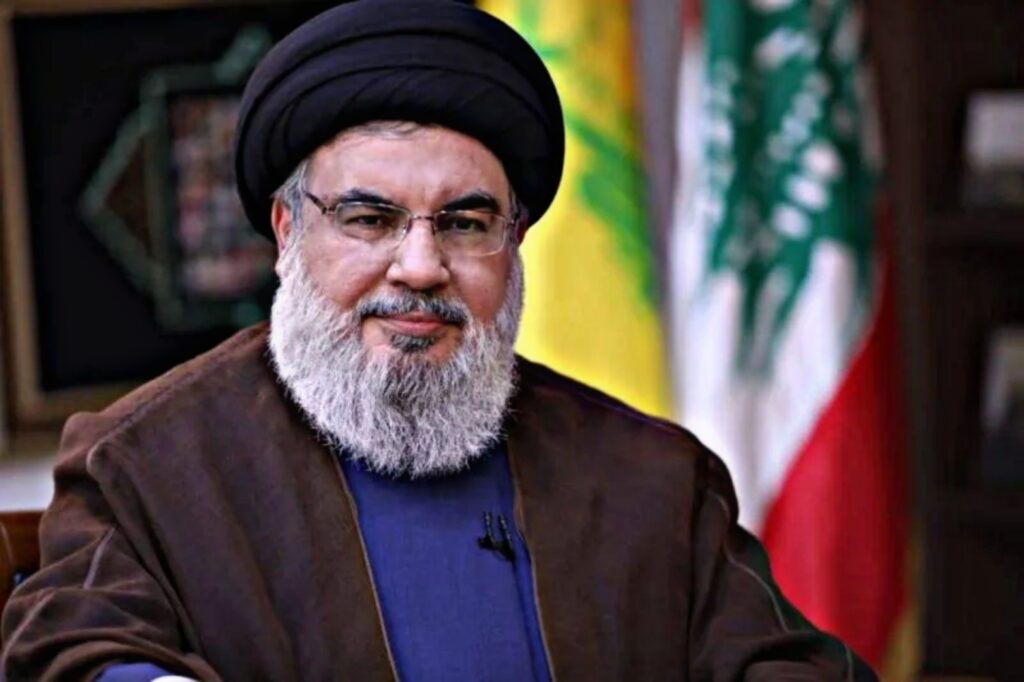Hassan Nasrallah is a prominent Lebanese political and religious figure, best known as the Secretary-General of Hezbollah, a Shiite Islamist militant group and political party based in Lebanon. Below are key details about him:

Basic Information:
- Full Name: Hassan Nasrallah
- Date of Birth: August 31, 1960
- Place of Birth: Bourj Hammoud, Lebanon
- Nationality: Lebanese
- Religious Affiliation: Shia Islam
Background and Early Life:
Nasrallah was born into a modest family in Beirut, Lebanon. He moved with his family to the southern part of Lebanon (the village of Bassouriyeh) during his youth. He pursued religious studies in Iraq at the Shia Islamic seminary in Najaf, where he became deeply involved in Shiite political movements.
Hezbollah Leadership:
- Leadership Style: Nasrallah is known for his charismatic leadership, powerful oratory skills, and political acumen. His speeches are widely watched, particularly in the Arab world.
- Hezbollah’s Influence: Under his guidance, Hezbollah has been involved in significant conflicts with Israel, most notably the 2006 Lebanon War. Hezbollah also plays a central role in Lebanese politics, with a strong military wing and substantial influence over Lebanon’s Shiite population.
Hezbollah's Ideology and Alliances:
- Anti-Israel Stance: Hezbollah, under Nasrallah, has a vehemently anti-Israel stance, positioning itself as a resistance movement against Israeli occupation, particularly in southern Lebanon.
- Support from Iran and Syria: Nasrallah and Hezbollah receive significant financial and military support from Iran, which shares a Shiite Islamist ideology with Hezbollah. Syria has also been a key ally, providing logistical and political backing.
- Involvement in Syrian Civil War: Hezbollah, under Nasrallah’s leadership, intervened in the Syrian Civil War to support the government of President Bashar al-Assad, further strengthening the group’s military capabilities and regional influence.
Personal Characteristics:
Nasrallah is rarely seen in public for security reasons. Most of his public appearances are made through video broadcasts, as Hezbollah leaders, including Nasrallah, have been targeted by Israeli forces.
Major Achievements and Influence:
- 2000 Israeli Withdrawal: One of Nasrallah’s major accomplishments was the withdrawal of Israeli forces from southern Lebanon in 2000, which he framed as a victory for Hezbollah’s armed resistance.
- 2006 Lebanon War: The 34-day conflict between Hezbollah and Israel in 2006 was a major event in Nasrallah’s leadership. Although Lebanon suffered heavy damage, Nasrallah’s popularity soared in the Arab world for Hezbollah’s strong resistance.
Controversies and Criticism:
- Terrorism Accusations: Hezbollah, and by extension Nasrallah, is designated as a terrorist organization by several countries, including the U.S., Israel, and several European nations, due to its militant activities and attacks against Israeli and Western targets.
- Involvement in Lebanon’s Politics: Hezbollah’s military wing remains active despite a 2008 agreement to avoid using force domestically, and the group has been accused of exerting undue influence on Lebanese politics and government.
Current Role:
Nasrallah remains one of the most influential figures in Lebanon and the broader Middle East, particularly among Shiite Muslims. Despite numerous challenges, including the civil war in Syria and Lebanon’s ongoing political and economic crises, Nasrallah continues to lead Hezbollah as both a political and military force.
His speeches continue to resonate with Hezbollah supporters and have a significant impact on regional geopolitics, particularly regarding Lebanon’s tense relationship with Israel and Hezbollah’s involvement in regional conflicts.
